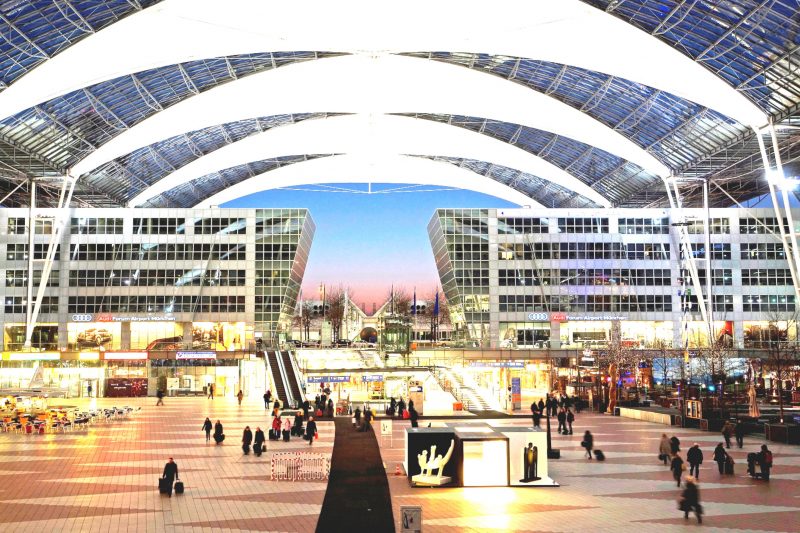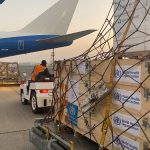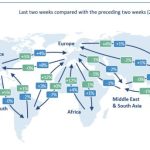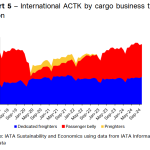Munich Airport Inspiring Innovations- By Gemma Q. Casas
The digitalization with the focus on seamless travel concepts will play an essential role in the future of all airlines and airports. IT and corporate strategy divisions need to cooperate closely in the planning and realization of their airport’s “digital journey” to provide a stress-free and smooth travel chain for the passengers.The passenger and market outlook for the global aviation industry remains strong with more people projected to travel by air in the future as the middle income population in India, China, Southeast Asia and other emerging markets rises.
Experts estimate global passengers to reach 65 billion by 2030, over-burdening some airports but a boon to some that invested and prepared for such occurrence in terms of technology and new infrastructure.
Germany’s Munich Airport, one of the busiest in the world, is leading the pack in Europe with its innovative ideas and pragmatic approach in seamlessly connecting people and in recent years, making the aviation industry more environment-friendly by tackling the carbon emission problem head on.
In an exclusive interview with Air Cargo Update, Dr. Michael Kerkloh, the political scientist who has been leading the airport’s 9,000-strong men and women as president and CEO, shares his insights on how they have turned Munich Airport from a mere complex of runways and buildings where passengers and cargo take-off, to a Five-Star Airport status, the first and only one in Europe, commanding a high-price for its ideas and innovations.
Kerkloh, who was voted recently as president of the powerful Airports Council International Europe (ACI), which oversees more than 500 airports across 45 countries in the continent, also talks about the impact of security issues on airport finances and how they aim to address it as well as other important matters affecting the industry.
“I am looking forward to continuing the successful work of my predecessors and bringing more visibility to the issues affecting the airport industry and to the work of the ACI Europe team in Brussels,” says Kerkloh.
Taking on more important roles across the globe, Germany is indeed fast becoming a reluctant political powerhouse the world looks up to for protection and sound decisions even in the aviation industry.
Record Year
Munich Airport marked its first half of 2017 with 21 million passengers, a record since it began operations in 1992.
The figure represents the full-year record for 1999, convincingly demonstrating its powerful dynamic growth.
In 2016, passenger traffic at the airport where people from all over the world descend on varying times of the year to attend international events at the globally famous Messe Munchen, was up 6 percent while total take-offs and landings totaled 200,000 during the period, up by 4 percent.
Cargo movement in 2016 at Munich Airport was also a boon with a new record high of 9 percent year-on-year increase to approximately 180,000 tons.
With the substantial traffic increases, Munich Airport outpaced the industry as a whole in Germany – largely on the strength of a strong performance by the European traffic segment, which showed an impressive 8 percent year-on-year increase in total passengers, explained Corinna Born, Director of International Media Relations at Munich Airport.
Dr. Kerkloh says “Munich Airport is indeed looking stronger than ever before” with the goal of attaining new standard of quality in the coming years.
“We’re now in the enviable position of being poised to add more chapters to our success story for the next 25 years – in the interests of Bavaria and the people who live here,” he said.
The Future
Munich Airport made history with the opening of its first midfield terminal in April 2016, which expands its capacity by 11 million passengers per year with plenty of space for retail and dining options for travelers.
Fast becoming known as the Green Airport of Germany, it has also set new environmental airport standards as well as expanding its business enterprise to handling airports around the world.
“In terms of its environmental impact and energy efficiency, the “green terminal” sets new standards for the airport industry. The latest milestone in the airport’s dynamic development was Lufthansa’s decision to station 15 Airbus A350 jets in Munich,” explained Dr. Kerkloh.
“Serving long-haul routes with these advanced widebody jets will result in enormous reductions in fuel consumption, emissions and noise. This also corresponds with the airport’s strategic climate protection targets,” he added.
This month, Munich Airport’s operating company FMG has established a new 100% subsidiary for its international activities. Under Munich Airport International GmbH (MAI), Munich Airport now has a tailor-made platform for handling international contracts in areas of consulting, airport management and training previously implemented by the parent company.
FMG’s know-how and operational success as a full-service airport operating company and its expertise in commissioning new airports have made it a popular choice as a consultant in the aviation industry, generating annual sales of around 10 million Euros.
FMG’s international business division has provided tailor-made solutions at more than 50 airports around the globe, including Bangkok (Thailand), Quito (Ecuador), Madrid (Spain), Barcelona (Spain), Rio de Janeiro (Brazil) and Delhi (India). It plans to open sales offices for Asia, the Middle East and Central and South America.
At present the experts from Munich Airport are involved in the management of airports in Palmerola (Honduras), Cairo (Egypt), and Taif (Saudi Arabia). Consulting services are being provided at such airports as Muscat (Oman), Abu Dhabi (UAE), Riyadh (Saudi Arabia), Quito (Ecuador) and Changi Airport in Singapore.
Dynamic leader
Part of Munich Airport’s success is a strong leadership that the workforce and management lean on. At the back of this is Dr. Kerkloh who began his aviation career in 1995 at Frankfurt Airport after earning his degree in economics and doctorate in political science.
“In 1995, I became one of two managing directors at Hamburg Airport. In September 2002, I was appointed as president and CEO of Munich Airport. I presided the ADV (German Airport Association) until the end of 2016 and was member of the governing bodies of a number of leading industry organizations,” Dr. Kerkloh recalled.
“In June 2013, I was elected for a three-year term to the board of ACI and became Vice President of the ACI in June 2015. As you can see, I am hundred percent dedicated to the aviation industry.”
A people-person who munches Haribo’s gummy bears for lunch if his schedule is too tied up to even grab a sandwich, Dr. Kerkloh takes care of the airport’s manpower to ensure that they get a fair share of their hard work.
“Munich Airport currently employs 9,000 people. With their hard work and commitment, the employees have played a decisive role in Munich Airport’s success. The airport management team understands the enormous importance of a motivated and competent crew, and has therefore, made it a top priority of the airport’s personnel policy to create and develop attractive jobs and good environments,” the airport executive said.
Munich Airport is currently ranked as top employer in the German transportation and logistics sector, according to a recent study by the news magazine Focus.
“We are well aware of our responsibility for the success and satisfaction of the staff and make substantial investments, for example, in measures to help employees with their work-life balance we offer job trainings in our Airport Academy,” the C noted.
A big fan of Borussia Dortmund (BVB), Dr. Kerkloh said more than handling people, the hardest part of his job was when he welcomed FC Bayern after it won the Champion Leagues Finals against the BVB in 2013.
“You know I am a big soccer enthusiast and my absolute favorite soccer team is Borussia Dortmund (BVB). So, living and working in Munich, the home of Borussia Dortmund’s biggest competitor FC Bayern, can already be quite a “challenge” for a Borussia fan,” Dr. Kerkloh said.
“When FC Bayern won the Champion Leagues finals against Borussia Dortmund in 2013, as Munich Airport CEO, I had to officially welcome and congratulate the FB Bayern Munich winner team upon their return to Munich Airport. You can believe me being a convinced Borussia fan “I suffered.” But since Borussia Dortmund’s club colors are black and yellow, I ordered as many black and yellow “follow-me” cars to be parked directly on the apron around the FB Bayern Munich welcome ceremony ,” he fondly recalls.
Major Accomplishments
Over the past 15 years, many innovations had been realized at Munich Airport but its title as the first and only Five-Star airport in Europe stuck and became the envy of others in the continent.
“Being awarded as Europe’s first and only Five-Star Airport by Skytrax in 2011 was an extraordinary accolade during my career,” said Dr. Kerkloh.
Another accomplishment was a partnership with Lufthansa Airlines to plan, finance, construct and operate a terminal building. Worldwide, this was the first agreement between an airport operator and an airline to run a terminal.
“The idea behind this unique joint venture was to build an efficient and fast hub system and to bundle airport and airline expertise in order to create a terminal building offering maximum service and comfort to passengers,” said Dr. Kerkloh.
“When Terminal 2’s capacity reached its limit of 25,000,000 passengers per year, the construction of the satellite building was the logical continuation of this success story – taking passengers to a new level of comfort.
Further, we are proud of the many honors and awards we have received over the years,” he added.
Dr. Kerkloh is also proud that Munich Airport is recognized as a pioneering Green Airport.
“I consider it also a major accomplish-ment that the governing bodies of the airport operating company have adopted a resolution stating that the CO2 emissions directly attributable to the airport’s operations will be reduced by 60 percent by 2030,” he said.
Through 2030, Munich Airport will invest 150 million Euros to finance all environment related projects geared for its climate protection program.
“A responsible approach to the environment plays a key role in our corporate strategy. We have already rolled out a number of projects that go far beyond statutory requirements and industry standards. Until 2030, we will invest 150 million Euros in total for this climate protection program,” Dr. Kerkloh explained.
Accounting for 4 percent of the GDP in Europe, airports contribute significantly to the continent’s economy.
In 2015, the more than 500 airports across 45 European countries which are members of the Airports Council International Europe (ACI) handled more than 1.9 billion passengers, 18.9 million tons of freight and 22.8 million aircraft movements.
Dr. Kerkloh, who now leads this trade organization talks to Air Cargo Update about his new role and his views on issues that affect the global aviation industry.
ACU: As a German, some view your new role as another proof of Germany’s increasing widening global influence and leadership role. Some say Germany is fast becoming a reluctant global political powerhouse. What can you say about that?
I consider myself a European citizen and in my role as ACI Europe president, I will strive for a positive development of the European airport industry evaluating different interests and needs. That is also how I see Germany – engaged in balancing out European interests and giving active support to hold Europe together.
What are your top agenda as far as policies are concerned as the new ACI president? Please elaborate.
Well, here are some of the most pressing issues on the agenda: Security, the EU Aviation Strategy and how airports need to continue supporting it, climate action, the capacity crunch, digitalization and the airport, Brexit and the list does not stop there.
What would you say are the top challenges facing European airports in this digital age? Please explain.
For many airports, digitalization is already a strategic field of action within their corporate strategy. The digitalization with the focus on seamless travel concepts will play an essential role in the future of all airlines and airports.
IT and corporate strategy divisions need to cooperate closely in the planning and realization of their airport’s “digital journey” to provide a stress-free and smooth travel chain for the passengers. The challenge will be to juggle with numerous airport divisions as well as external partners. Data is the currency and the issue of ownership of data is really only beginning. The next few years will be instrumental in deciding the direction this takes for a generation.
You have successfully run Munich Airport for many years. Perhaps ACI members can learn something from your experience. From an economic perspective, how should airports be managed to keep it profitable while satisfying all stakeholders, including the passengers?
You raise an interesting point and knowledge exchange is one of the primary pillars of ACI Europe’s activities towards its members. Given the scope of the membership and the various sizes of airports involved, there is no one-size-fits-all in terms of advice that going to work for everyone. And although I have been in this business a long time, one of the things I find increasingly interesting is the number of CEOs coming to this industry from other sectors–bringing new fresh thinking, importing ideas from elsewhere–it’s an exciting trend and one that I think is having a very positive influence on the business.
Would you recommend higher passenger and terminal fees at this point? What should airports consider when imposing fees?
With a membership of 500 airports of varying sizes, resources and investment capabilities, I think it would be unwise of me to recommend any one strategy. What I will say is that airport charges are part and parcel of airports being businesses in their own right. Even with that, airlines still pay far less than the cost of the infrastructure they use and every airport seeks to keep its charges competitive, so that they can continue to attract more airline customers and more passengers.
Is Brexit a major concern for ACI as far as moving goods is concerned because of the changes in trade policies?
Brexit is absolutely one of the biggest concerns on our radar at the moment. The implications for European aviation are enormous – especially when you consider the level of connectivity between the UK and the other countries in the EU-27. In the event of a hard Brexit, it would cause major disruption. And when you consider how aviation relies on forward planning, the risks are very real and the clock is ticking.
However, I can say that ACI Europe has been working on this issue for some time now and we are doing a lot to highlight what’s at stake, to the various parties involved.
What is ACI’s goal as far as reducing carbon emission is concerned in the aviation industry?
One of our top priorities at ACI Europe is facilitating airport’s efforts to reduce the industry’s impact on climate change. At COP21, we announced that we would have 50 carbon neutral airports by 2030.
In July, when President Trump decided to back out of the Paris agreements, we decided to double-down on our commitment. So the new pledge is to have 100 carbon neutral airports in Europe by 2030. We have 27 already and there are certainly others who are very motivated to get there in the near future as well. Watch this space!
How big of a concern is airport security as far as you’re concerned considering the number of fatalities and wounded at Belgium international airport at last year’s terror attack?
Aviation security and in particular airport security – is a major priority. It has many facets to it, ranging from ever-evolving technology in airside security and hold baggage screening, cybersecurity, dealing with the implications of heightened security on landside security and of course, most recently the new measures for screening personal electronics being imposed on our airline partners by the Trump administration.
ACI Europe invests a lot of time, energy and resource into seeking the best ways that the various members of the air transport sector can work with home affairs, border control and regulators to make airport security as secure and efficient as possible.
However, it is not an easy task, not least in the current climate where we rely so much more on better intelligence-sharing between government agencies, to combat the threat of terrorism visiting not just the airport, but any public space.
Would you convene your members for a meeting to further discuss security measures that should be unilaterally adopted across all international and domestic airports in Europe to ensure public safety? Please explain further why or why not.
I can assure you that these kinds of meetings happen all the time within ACI Europe. There is regular dialogue and knowledge exchange between our members – last year, we had a Special Summit on Security & Crisis Management.
ACI Europe has also worked hard to establish and maintain excellent channels of communication with the European Commission, ECAC, the US Department of Homeland Security and other relevant agencies.
Is the cost of providing security eating up a large chunk of airport budget? How should airports cope up?
Yes, indeed it is. Pre-9/11 it was only about 5 to 8% of airport’s operating costs. Now it’s something closer to 20%, I believe. That’s quite a jump and in the US, they have the advantage of security being entirely publicly funded and operated by the TSA.
Cutting-edge technology and lots of innovations appear to be the new norm to enhance passenger experience and speed up services nowadays. But for some countries in Europe, implementing changes is still difficult due to budget constraint. Do you think the EU should step in to address this situation?
Airports can benefit from existing EU-funding programs.
















